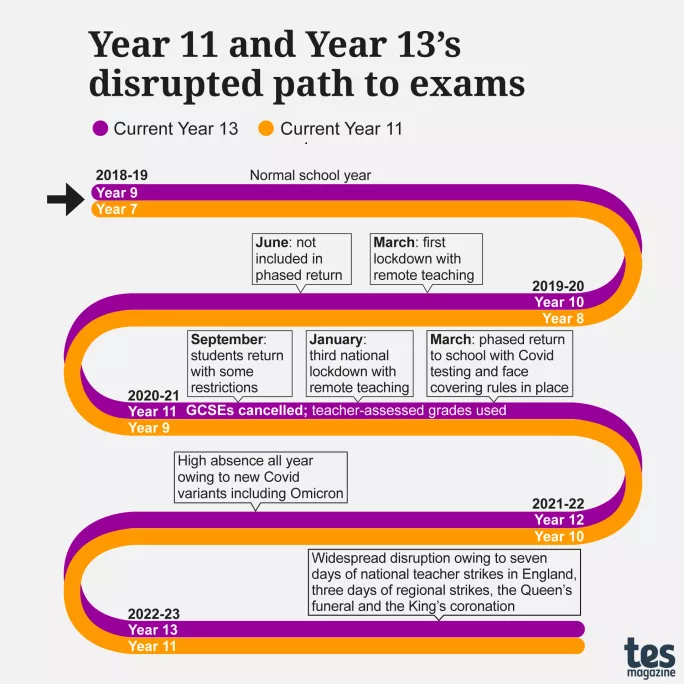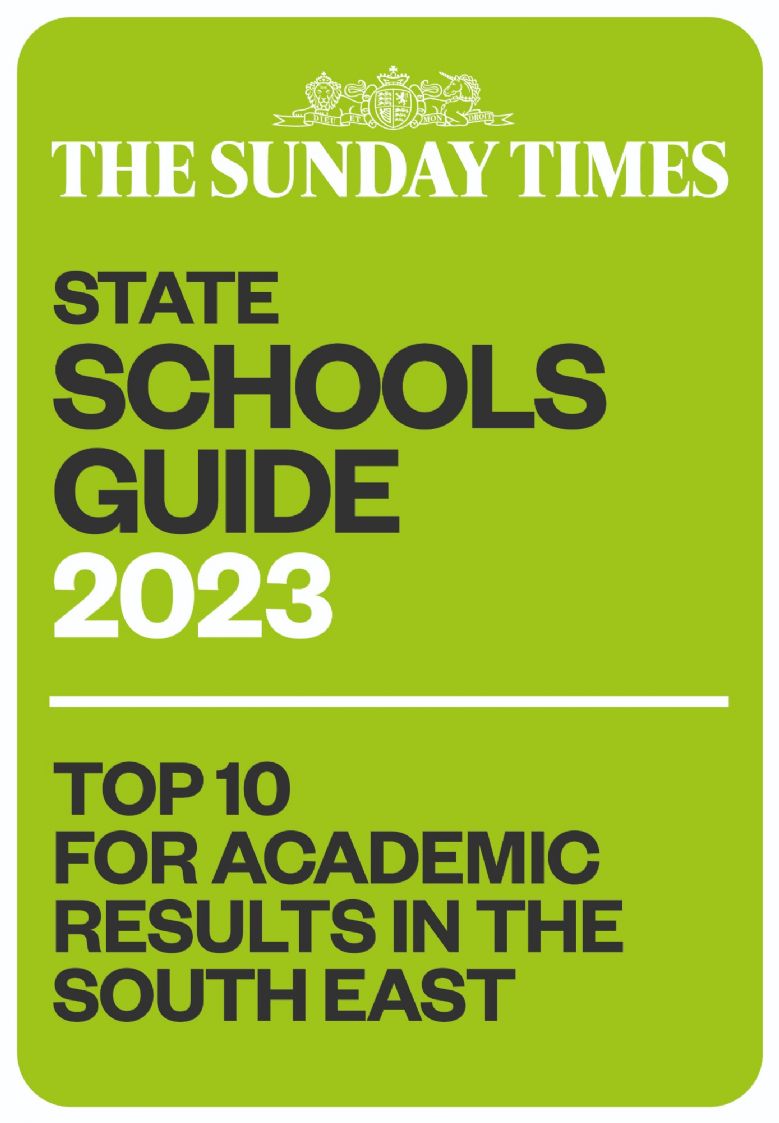Academic Outcomes
 "Pupils and sixth formers achieve exceptionally well across the whole curriculum."
"Pupils and sixth formers achieve exceptionally well across the whole curriculum."
Ofsted, November 2021
Sunday Times '2025 Parent Power' guide - December 2024
The Sunday Times survey is widely acknowledged as an authoritative survey of the country’s highest-achieving schools. It links to school websites and Ofsted inspection reports, while also drawing on exam results for its league tables.
The ranking in these annual tables has always been based on actual grades achieved. The methodology takes into account both GCSE and A Level outcomes, giving double the weighting to A Levels. Taking both levels of qualification into account gives a much broader indication of the overall quality of education than individual performance measures on their own.
This year, the combined results of Year 11 and Year 13 mean that...
Langley Grammar School was ranked at
#31 in the 2024 national table
#9 in the South-East region
You can access the full Parent Power 2025 Guide online on the Times website. Please note that you may need to register to access the full tables on this site through a subscription service/paywall.
2024 GCSE and A Level examination results
This year was the second year of 'normal' GCSE and A Level examinations following the disruption of the pandemic.
In 2020 and 2021, grades were awarded by centre-assessed grades (CAGs) and teacher-assessed grades (TAGs) respectively. These different forms of assessment meant that grades were higher than in normal exam years. In 2022, there was a transition year which meant that nationally, grades were roughly at the midpoint between 2019 and 2021. In 2023, grades across the country were overall broadly similar to the 2019 profile, with the 2024 outcomes also comparable apart from a slight increase in the proportion of A*/A grades awarded.
Please follow the links below for further information about the GCSE and A Level outcomes achieved by LGS Year 13 students in 2024 and previous years.
Sunday Times 'Parent Power' guide - December 2023
The Sunday Times survey is widely acknowledged as an authoritative survey of the country’s highest-achieving schools. It links to school websites and Ofsted inspection reports, while also drawing on exam results for its league tables.
The ranking in these annual tables has always been based on actual grades achieved. The methodology takes into account both GCSE and A Level outcomes, giving double the weighting to A Levels. It is possibly the only comparator tool that takes both levels of qualification into account.
Although not quite as impressive a positioning as last year, we were very pleased to see that
Langley Grammar School was ranked #52 in the 2023 national table
2023 GCSE and A Level examination results
In 2020 and 2021, grades were awarded by centre-assessed grades (CAGs) and teacher-assessed grades (TAGs) respectively. These different forms of assessment meant that grades were higher than in normal exam years. In 2022, there was a transition year that meant that nationally, grades were roughly a midpoint between 2019 and 2021.
In 2023, grades were expected to be similar to the 2019 profile at national level. In other words, students effectively had the same chance of getting a A*, a C, a 9 or a 7 as they would have done in 2019. This means that national results are lower than the three previous years. This is not unexpected and does not necessarily mean a decline in performance.
For Year 13 students, universities and colleges were aware of the policy decision to return to 2019 grading when they made offers earlier this academic year. Therefore, students were not at a disadvantage by the national-level return to pre-pandemic grading.
Please follow the links below for further information about the GCSE and A Level outcomes achieved by LGS students in 2023 and previous years.
 The DfE has cautioned against trying to compare this year’s results with those from the last three years. The lingering impact of the pandemic has been variable between schools and between students which makes comparisons very difficult.
The DfE has cautioned against trying to compare this year’s results with those from the last three years. The lingering impact of the pandemic has been variable between schools and between students which makes comparisons very difficult.
It is also worth remembering the disruption which both year 11 and Year 13 students have experienced, as shown in the following diagram published recently by the Times Educational Supplement.
Sunday Times 'Parent Power' guide - December 2022
The Sunday Times survey is widely acknowledged as an authoritative survey of the country’s highest-achieving schools. It links to school websites and Ofsted inspection reports, while also drawing on exam results for its league tables.
 The ranking in these annual tables has always been based on actual grades achieved. The methodology takes into account both GCSE and A Level outcomes, giving double the weighting to A Levels.
The ranking in these annual tables has always been based on actual grades achieved. The methodology takes into account both GCSE and A Level outcomes, giving double the weighting to A Levels.
The ‘headlines’ from the 2022 tables are that….
Langley Grammar School was ranked at……
#37 in the national table
#8 in the South-East
The Sunday Times guide said....
Langley Grammar School has performed very well in the Parent Power rankings — rising 57 places in our national table of state secondaries....
The school’s success is shown by the fact that 140 out of 160 sixth-formers got places at their first-choice university; eight got into Oxford or Cambridge. Last year’s “outstanding” Ofsted report and an £18 million investment in new buildings have provided an extra post-pandemic boost."
You can read more on our website here and you can also access the full Parent Power Guide online. Please note that you may need to register as this is a subscription service.
2022 GCSE and A Level examination results
In 2020 and 2021 results nationally rose, especially the number of candidates achieving As and A*s at A level. This was due to the different type of assessment used - see the notes further down this page.
As 2022 was the first year following the pandemic disruption in which exams were held, the government had to decide how to approach grading. It decided that the fairest system was a transition year between 2021 national results and 2019 national results. This means that results for each qualification were expected to roughly be around the midpoint between those years.
This does not mean that students were marked more harshly. This year, exam board markers marked papers in exactly the same way as they had done previously (2019 and before). Once enough marks were received, exam boards then set grade boundaries in line with the policy above. This means that grade boundaries are lower than the last time they were set (2019) to allow for more students than normal to achieve each grade across the country.
A range of other mitigations to reflect lost learning were put in place (see below). As well as more generous grading compared to a normal year, the exam boards provided:
- advanced information about what was or wasn’t on the exam paper, which was released in spring 2022
- formula and equation sheets in some STEM subjects
- less content and optionality in GCSE English literature, history and geography
- changes to coursework and practical work in some subjects
The DfE has cautioned against trying to compare this year’s results with pre-pandemic results. The impact of the pandemic has been variable between schools and between students which makes comparisons very difficult.
For further information about the A Level results achieved by LGS students in 2022, please click here.
For further information about the GCSE results achieved by LGS students in 2022, please click here.
2021 GCSE and A Level outcomes
Public examinations in 2021 were cancelled due to the coronavirus pandemic.
This year, following the cancellation of exams, grades were awarded through a process of Teacher Assessed Grades (TAGs), against a national standard and approved and awarded by the exam boards.
Further information about the process can be found here.
The government is not publishing performance data for any schools or colleges this year due to the varying impact of the pandemic.
2020 GCSE and A Level outcomes
Public examinations in 2020 were cancelled due to the coronavirus pandemic.
In June 2020, schools were asked to supply the examination boards with the grades the school believed Year 13 students would most likely have achieved had they sat the examination in summer 2020 as normal. These are called the Centre Assessment Grades (CAGs).
The original intention was that examination boards would then apply a statistical standardisation process at subject level intended to ensure that the final grades awarded were broadly in line with what would normally be expected given the school's historic outcomes.
Extensive media coverage of the issue around the time of the release of A Level results led to a change of policy. In a statement on 17th August, the Department for Education confirmed that the GCSE, AS and A Level grades awarded would now be on the basis of the higher of the Centre Assessment Grades or the grades calculated through the algorithm.
For more information about the process, please read the following guide produced by the qualifications authority Ofqual (updated on 19th August 2020).
The 2020 outcomes are not directly comparable between schools and will not be used by the Department for Education in performance tables.
2019 and 2018 examination outcomes
Langley Grammar School students achieved very good results in both
GCSE outcomes are important, but it is success at A Level which determines students' prospects for higher education. Our A Level outcomes have been consistently excellent over many years.
/70DF57A674126290BB39AB5E772556CC.png) Taken together, the 2018 and 2019 GCSE and A Level results placed the school consistently in the top 100 schools in the country in the Sunday Times 'Parent Power' table. This ranking gives a higher weighting to A Level outcomes.
Taken together, the 2018 and 2019 GCSE and A Level results placed the school consistently in the top 100 schools in the country in the Sunday Times 'Parent Power' table. This ranking gives a higher weighting to A Level outcomes.
The separate pages for A-Level and GCSE outcomes provide further information on the achievements of students in the last three year, together with a breakdown of results by subject at each level.
For more information about Langley Grammar School’s academic outcomes in 2019, please click on the link below to go to the School Performance information published by the Department for Education.
